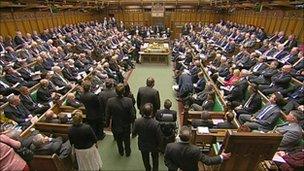Sir George Young urges action over expenses deals
- Published

The expenses scandal put MPs' claims in the spotlight
Failing to publish more details of expenses complaints could damage Parliament's reputation, Commons Leader Sir George Young has warned.
It follows criticism of a procedure by which MPs who wrongly claimed expenses have been allowed to repay the money without it being widely publicised.
Standards commissioner John Lyon says it is used in "less serious" cases but wants details published on his website.
Sir George urged MPs to take Mr Lyon's proposals, made in January, forward.
The most serious breaches of Parliamentary rules are investigated by Mr Lyon, whose report is published by the Commons standards and privileges committee.
'Secrecy' criticism
The committee has the power to make MPs apologise or suspend them from the Commons for a fixed period.
But breaches judged less serious can be dealt with by a procedure known as "rectification" - where MPs apologise for mistakes made and agree to repay the money. The commissioner writes to the person who made the complaint with his findings, but they are not publicised by the standards committee.
The procedure came to light earlier this year when the Daily Telegraph reported that an MP who had claimed twice as much petty cash as she was permitted, had been allowed to repay nearly £5,750 without a full investigation.
It has led to criticism of the procedure as "secret deals" for MPs. Former Speaker Baroness Boothroyd said it should not have been allowed, telling the BBC in January: "I am appalled if it is the case that this can be done behind the scenes - you pay up and we won't name you."
The commissioner's office has stressed that the process is not secret - the complainant is free to publicise Mr Lyon's findings if they wish.
But Mr Lyon has argued that in view of the public interest following the MPs' expenses scandal, he felt there were "strong arguments" to publish more details of cases dealt with under the rectification procedure.
In January he proposed publishing on his website his decision letters and supporting evidence, for cases dating back to 2008.
The standards committee, chaired by Sir George before he was promoted to the cabinet after the general election, approved the proposal at the time but said they would need MPs' agreement.
Sir George, now Commons leader, wrote to the committee about the issue on Wednesday, saying: "The government fully supports these proposals. The failure to publish more details of the use of rectification is clearly potentially damaging to the House's reputation."
He said as the Commons' own standing orders had to be changed to allow the information to be published, it was up to the new Backbench Business Committee to find the time for a debate.
"A request from the Standards and Privileges Committee to the Backbench Business Committee would therefore be the appropriate way of taking this reform forward," he wrote.
In 2009-10 Mr Lyon dealt with 51 complaints, 20 of which were subject to a full investigation and the findings referred to the standards committee. Fourteen were dealt with via the rectification procedure - most of which were complaints about MPs' use of Commons stationery and pre-paid envelopes.